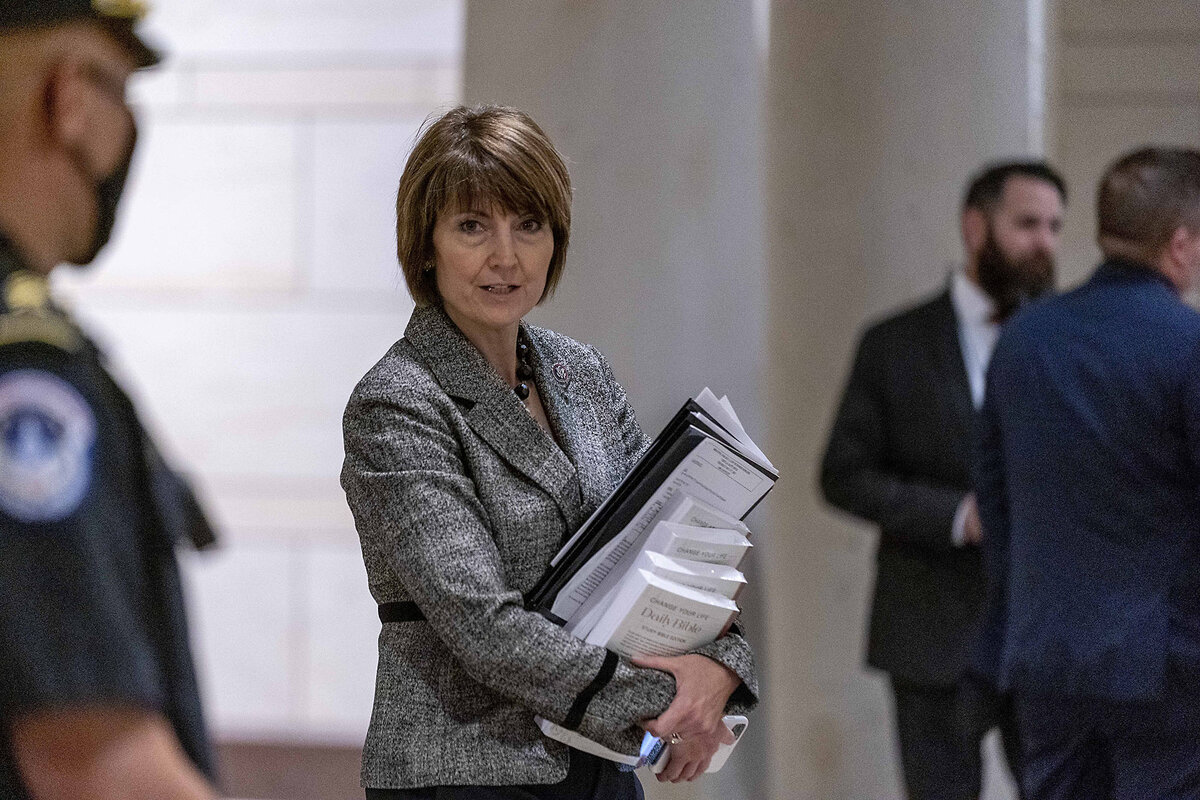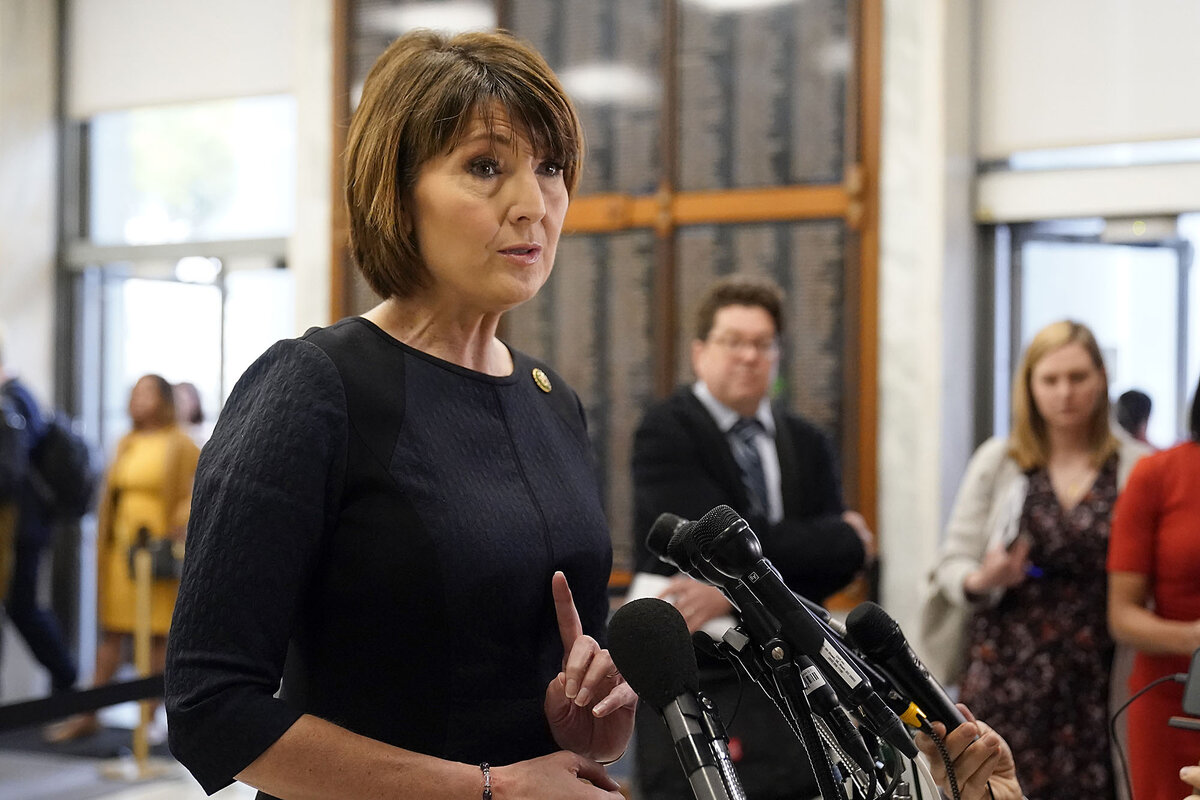Cathy McMorris Rodgers Q&A: How faith shaped her path in Congress
Loading...
| Washington
Over her 20 years in Congress, Rep. Cathy McMorris Rodgers of eastern Washington has risen to hold key positions as a GOP leader. She credits her Christian faith with forging that path.
During her time in office, religious worship has declined in the U.S. and there’s controversy surrounding the role of religion in public life. Yet prayer remains a prominent part of the daily bustle in Congress.
Why We Wrote This
Religiosity among the U.S. public is falling, yet Congress remains steeped in spiritual traditions. One longtime congresswoman speaks about how her faith informed her two national decades in politics.
In an interview, Chair McMorris Rodgers offers a window into how faith shapes her daily work as a member of Congress – from running high-stakes hearings to overcoming rancor among members.
One key lesson she learned was from her Jewish chief of staff, who helped her understand that the days leading up to Yom Kippur are days to get right with God and each other.
“Sometimes I feel like we need that on Capitol Hill. We need a time when we ask forgiveness,” she says. “None of us are perfect. This is the United States of America, where the preamble says, ‘We the People ... in Order to form a more perfect Union ...’ That search continues.”
Twenty years ago, Cathy McMorris Rodgers of eastern Washington became the 200th woman elected to Congress. She has since risen to become chair of the House Republican Conference from 2012 to 2018 and the first female chair of the powerful Energy and Commerce Committee.
Representative McMorris Rodgers is retiring from Congress next month. In a special gathering on the House floor last week, many of her colleagues cited her Christian faith as a key part of her influence and impact on the Hill.
During her time in office, religious worship has declined in the United States, with only a third of the country now attending church regularly. There’s also controversy surrounding the role of religion in public life and politics.
Why We Wrote This
Religiosity among the U.S. public is falling, yet Congress remains steeped in spiritual traditions. One longtime congresswoman speaks about how her faith informed her two national decades in politics.
Yet prayer remains a prominent part of the daily bustle in Congress. Both the House and Senate open with prayers from their respective chaplains, members pray with each other and with constituents, and Congress annually hosts the National Prayer Breakfast. Some 88% of members are Christian, compared with 63% of the general population; 6% are Jewish, compared with less than 3% of the general population; and there are a handful of Muslim, Hindu, Buddhist, and otherwise affiliated members.
In an interview conducted in her office, Representative McMorris Rodgers offers a window into how her faith has informed her approach to collaboration in such a divided Congress. A foundational Bible verse for her tenure has been Proverbs 3:5, 6 – “Lean not on your own understanding; In all your ways acknowledge Him, And He shall direct your paths.”
Her comments have been condensed and edited for clarity.
What Scripture did you read this morning?
For the last six or seven years, I’ve been reading through the Bible in a year. [This morning] I read [from] Amos and Revelation. And then a psalm and a proverb.
It’s really the spiritual discipline of reading God’s Word every day. In my time in Congress, I have found that it’s really important.
There were days when I allowed the busyness of the schedule to crowd out some of that time, and days when I might catch a devotional on the run on my app. People travel from eastern Washington to come to Washington, D.C., to pray, and they hope to have some time with me to pray as a representative. There had been times that I had told them, “Sorry, I’m too busy today.”
I’m too busy to pray? God did a work on my heart and really convicted me that I must make prayer my No. 1 priority.
I started praying more faithfully over my schedule and the meetings and the people I was going to meet. It’s been incredible to me, how I walk onto the House floor, and the members that I need to talk to [are right there] – done, done, done, done.
I never understood that [Bible] verse, His yoke is easy, His burden is light. I was like, this feels very burdened. But as you become more aware that God is directing your path, it is easier. It’s been amazing in the last 10 years, how it has been easier. And I’ve also felt like there’s been more success in the world’s eyes.
How have you approached the division and rancor on Capitol Hill?
I used to have a Jewish chief of staff for 10 years. And every year leading up to Yom Kippur, Jeremy would come to me and he would say, "Congresswoman, if I’ve done anything to offend you, intentional or not, would you forgive me?" I came to learn that the days leading up to Yom Kippur on the Jewish calendar are days to get right with God and with one another.
Sometimes I feel like we need that on Capitol Hill. We need a time when we ask forgiveness. We need more grace; we need more forgiveness; we need to be seeking reconciliation. None of us are perfect. This is the United States of America, where the preamble says, “We the People ... in Order to form a more perfect Union ...” That search continues.
I think it’s really important that we continue to see God, that we continue to be the people that He wants us to be every day. And that’s why being in the Word, reading His Word and praying, is so important. Every day you get up and you thank God for His mercies that are new. And then by the end of the day, it’s like, “Oh, I fell short again. Forgive me and help me to do better.”
The March 2023 hearing that you ran with the TikTok CEO was unusually bipartisan and paved the way for legislation to end Chinese control of that platform in the U.S. How did you prepare for it?
I had the opportunity to sit down with him prior to that hearing in my office, and he said he wanted to answer any questions or any concerns that I had. After he left, I was very concerned that he obviously knows all the right things to say, but I don’t believe a word that he’s going to say. That was probably a week or so before. I really felt like there was so much on TikTok that was dark and targeting our kids in negative ways.
I needed an extra dose of wisdom and strength and courage to face it and to take it on in that hearing. We went in and we prayed before the hearing.
And it was one of those that both sides of the aisle were asking questions, raising concerns. This was not a partisan issue. Republicans and Democrats were concerned about activities on TikTok, what the real purpose of TikTok is here in the United States of America, and why it’s different here and in China, and data not being protected.
Did you feel like you were able to uncover some things in the hearing that didn’t get uncovered in your meeting with him?
Yes, and that hearing – I mean, it was one of those hearings. Everyone was talking about that hearing right here on Capitol Hill. Everyone was like, "Oh, you guys just really crushed it." And then I flew home and my staffer was showing me these clips basically making members of Congress out to be fools. I was very disturbed.
He had done a couple of videos – the CEO. And his videos went viral way beyond any reach that we had in that committee room. And I was like, wow, this is ... a big battle.
Then we worked a year before we had a vote. It was very hard to write legislation, and we had lots of constitutional attorneys helping us, multiple committees involved, working with the House and Senate.
When we brought that bill up for a vote again, some of the members of the committee went into the committee hearing room, and we prayed before the vote. And it was interesting, because one of the things I remember we prayed was that the enemy would be confused and that there would be a spirit of truth.
And the next morning, when we woke up, TikTok had blocked their 177 million users from accessing the app until they called their member of Congress and urged them to vote no.
And the switchboard, you had these kids calling, like, “I don’t even know who you are, but I gotta get on TikTok.” I mean, there were kids that were desperate. It was really sad.
The enemy was confused. It was a glimpse of how TikTok users could be manipulated. So we went into the markup that day, and it passed out of committee 50-0 at a time when most people talk about how the rancor and division make it difficult to get anything done. Republicans and Democrats came together to protect our kids and protect this nation from a tool of the Chinese Communist Party. [After this interview, the U.S. Supreme Court announced that it would hear a challenge to this law Jan. 10.]
Mike Johnson faced a lot of critical coverage digging into his Christian beliefs after being elected speaker of the House last fall. How has he navigated that?
When I nominated him, I talked about him having the heart and the mind for the job. I used the [biblical] reference, “Man looks on the outward appearance, but God looks on the heart.” That’s what I see in Speaker Mike Johnson, is that men will look at other things or make accusations, but God looks at the heart.
There’s a verse in Psalms, Psalm 77:19, that I have shared with him as encouragement. It talks about the path through the mighty waters, the path no one knew was there, and that God’s going to direct his path. It could be very different than any other speaker of the House, but keep following God’s direction and prompting in your heart.
Editor’s note: This story, initially published Dec. 18, has been updated with a clearer description of the interview’s focus and to mention coming review of the TikTok legislation by the U.S. Supreme Court.










